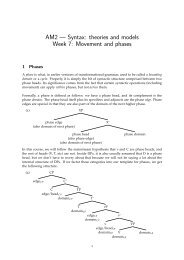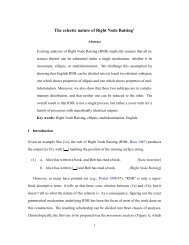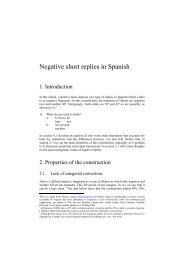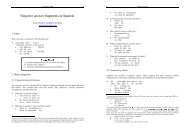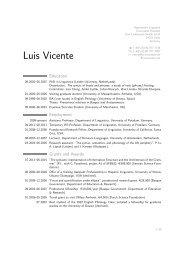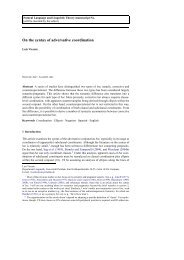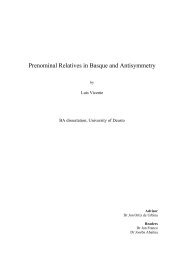Verb fronting in Mandarin Chinese - Luis Vicente
Verb fronting in Mandarin Chinese - Luis Vicente
Verb fronting in Mandarin Chinese - Luis Vicente
You also want an ePaper? Increase the reach of your titles
YUMPU automatically turns print PDFs into web optimized ePapers that Google loves.
Cheng & <strong>Vicente</strong><br />
<strong>Verb</strong> <strong>front<strong>in</strong>g</strong> <strong>in</strong> Mandar<strong>in</strong><br />
UCSC L<strong>in</strong>guistics Colloquium<br />
October 31, 2008<br />
b. * kan women zai [ ADJ mei-ge ren [shi kan-wan zhe-fen baogao] yihou], cai<br />
see, we be.at every.cl human cop see.asp this.cl report after then<br />
kai hui<br />
meet<strong>in</strong>g have<br />
“As for read<strong>in</strong>g, we only held a meet<strong>in</strong>g after everybody had f<strong>in</strong>ished read<strong>in</strong>g this report”<br />
This contrast suggest that verbal clefts <strong>in</strong>volve A-bar movement between the two copies.<br />
2.2.2 Argument for movement #2: lexical identity effects<br />
Locality effects <strong>in</strong>dicate that there is A-bar movement, but not that the cha<strong>in</strong> directly relates the two<br />
copies of the verb. Locality violations are also compatible with an <strong>in</strong>direct dependency <strong>in</strong>volv<strong>in</strong>g a null<br />
operator.<br />
The lexical identity restriction: the two copies of the verb must consist of the exact lexical item.<br />
One cannot get an “aboutness” construction. This is surpris<strong>in</strong>g because, otherwise, Ch<strong>in</strong>ese does allow<br />
aboutness topics.<br />
(20) * Lux<strong>in</strong>g, wo [shi zuo feiji]<br />
travel I cop sit airplane<br />
“As for travell<strong>in</strong>g, I fly”<br />
(21) ̌ yie-sheng dong-wu, wo zui xi-huan shi zi<br />
wild animal I most like lions<br />
“As for wild animals, I like lions the most”<br />
This restriction follows from the copy theory of movement if the two verbs are l<strong>in</strong>ks of one movement<br />
cha<strong>in</strong>.<br />
2.2.3 What type of movement?<br />
A fronted verb <strong>in</strong> a verbal cleft cannot pied-pipe other VP/vP <strong>in</strong>ternal material.<br />
(22) * [kan-le zhe-ben shu ], wo shi [kan-le (zhe-ben shu) ]<br />
read.asp this.cl book I cop read.asp this.cl book<br />
“As for read<strong>in</strong>g this book, I did <strong>in</strong>deed read (this book)”<br />
This might seem to <strong>in</strong>dicate that there is obligatory remnant predicate movement <strong>in</strong> these cases. This<br />
is unlikely, because the Ch<strong>in</strong>ese object shift rule has a very limited doma<strong>in</strong> of application (Soh 1998):<br />
it can only scramble DPs around low (VP-level) adverbs for defocalization purposes.<br />
(23) a. wo q<strong>in</strong>g-guo lian-ci na-ge ren<br />
I <strong>in</strong>vite.asp twice that.cl person<br />
“I <strong>in</strong>vited that person twice”<br />
b. wo q<strong>in</strong>g-guo na-ge ren lian-ci<br />
I <strong>in</strong>vite.asp that.cl person lian-ci<br />
“I <strong>in</strong>vited that person twice”<br />
Therefore, there are two possibilities (although we don’t have direct evidence for either of them as<br />
opposed to the other –this will rema<strong>in</strong> an open po<strong>in</strong>t).<br />
5 of 13



